Related Research Articles
A public service announcement (PSA) is a message in the public interest disseminated by the media without charge to raise public awareness and change behavior. In the UK, they are generally called a public information film (PIF); in Hong Kong, they are known as an announcement in the public interest (API).

McGruff the Crime Dog is an anthropomorphic animated bloodhound created by Dancer Fitzgerald Sample advertising executive Jack Keil through the Ad Council and later the National Crime Prevention Council to increase crime awareness and personal safety in the United States. McGruff costumes are used by police outreach efforts, often with children. McGruff was created in 1979 and debuted in 1980 with a series of public service announcements educating citizens on personal security measures, such as locking doors and putting lights on timers, in order to reduce crime. His name was selected as part of a nationwide contest in July 1980.
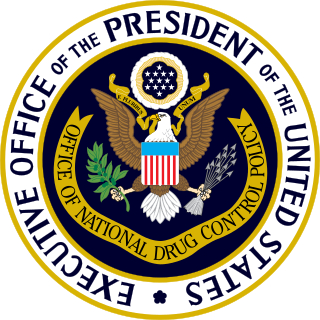
The Office of National Drug Control Policy (ONDCP) is a component of the Executive Office of the President of the United States.

The Advertising Council, commonly known as the Ad Council, is an American nonprofit organization that produces, distributes, and promotes public service announcements on behalf of various sponsors, including nonprofit organizations, non-governmental organizations and agencies of the United States government.
This article is intended to give an overview of several arguments for and against drug prohibition.

This Is Your Brain on Drugs was a large-scale US anti-narcotics campaign by Partnership for a Drug-Free America (PDFA) launched in 1987, that used three televised public service announcements (PSAs) and a related poster campaign.
In the 2006 federal election in Canada, the Liberal Party of Canada used attack ads against Conservative Party of Canada leader Stephen Harper. The Liberals, trailing in polls during the last weeks of the campaign, resorted to strong and often questionable negative ads directed towards the Conservative party, by attempting to depict Harper as an extreme right-wing politician. The advertisements were generally seen as excessive, and failed to prevent a Conservative victory.
Above the Influence originated as a government-based campaign of the National Youth Anti-Drug Media Campaign conducted by the Office of National Drug Control Policy in the United States that included broad messaging to focus on substances most abused by teens, intended to deliver both broad prevention messaging at the national level and more targeted efforts at the local community level.
FRANK is a national anti-drug advisory service jointly established by the Department of Health and Home Office of the British government in 2003. It is intended to reduce the use of both legal and illegal drugs by educating teenagers and adolescents about the potential effects of drugs. It has run many media campaigns on television, radio and the internet.
"You Wouldn't Steal a Car" is the first sentence of a public service announcement created in July 2004, which was part of the anti-copyright infringement campaign "Piracy. It's a crime." It was created by the Federation Against Copyright Theft and the Motion Picture Association of America in cooperation with the Intellectual Property Office of Singapore, and appeared in theaters internationally from 2004 until 2007, and on many commercial DVDs during the same period as a clip before the main menu or other previews appear, as either an unskippable or skippable video.
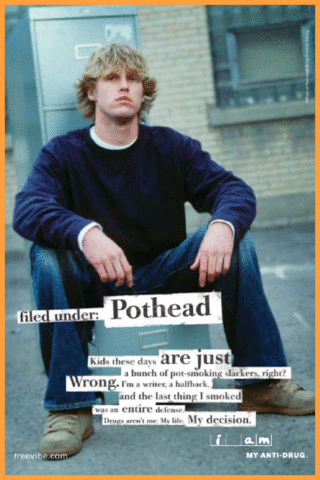
The National Youth Anti-Drug Media Campaign is a current domestic government propaganda campaign in the United States conducted by the Office of National Drug Control Policy (ONDCP) within the Executive Office of the President of the United States with the goal to "influence the attitudes of the public and the news media with respect to drug abuse" and of "reducing and preventing drug abuse among young people in the United States".
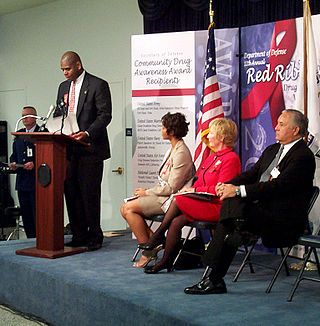
Partnership to End Addiction, first known as the Partnership for a Drug-Free America (PDFA) then later as the Partnership at DrugFree.org, and The Partnership for Drug-Free Kids, is a New York City-based non-profit organization which runs campaigns to prevent teenage drug and alcohol use in the United States. It is notable for mobilizing volunteer talent "against a single social problem" to help young people "live their lives free of drug and alcohol abuse," and to assist parents in prevention efforts. The organization gets input from scientists, specialists in communication, researchers and others, and offers resources for parents and teenagers on its website. It focused efforts to "unsell" illegal drugs such as cocaine, heroin, prescription drugs, marijuana, MDMA, and others, as well as discouraging the use of alcohol and nitrous oxide, by breaking away from a standard public service approach and doing a coordinated media campaign. While the organization has focused drug prevention advertising on broadcast media such as television, there are signs in recent years that it is shifting media support to emerging channels such as video-on-demand, digital technology and particularly the Internet. The organization's marketing experience was written up as a 58-page marketing "case study" for study by students at the Harvard Business School. The organization is perhaps best known for its iconic TV ad This Is Your Brain on Drugs, but it had made over 3,000 ads by 2011 while pursuing a flexible strategy.
Little Lungs in a Great Big World is a stop-motion animated tragicomedy educational public service announcement series that is part of a campaign for the FDA Center for Tobacco Products by FCB named "The Real Cost." The advertisements, released on March 15, 2017, were directed by British animator Peter Sluszka and produced by New York City studio Hornet. The commercials follow a set of anthropomorphic young lungs named Little Lungs that "smoked as a teen and never grew to normal size." Little Lungs tries to enjoy leisure activities with his friends but always ends up facing horrific consequences in his attempts to do so. FCB's approach towards animated entertainment for PSAs was a deviation from most anti-smoking advertisements that they felt were "overplayed warnings" most teenagers ignored.
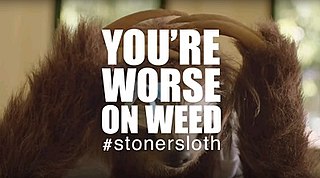
"Stoner Sloth" was an anti-cannabis public service announcement series of three videos, created by Australia's New South Wales Department of Premier and Cabinet in 2015.
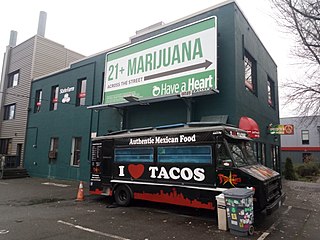
Cannabis advertising is the advertising of cannabis products to consumers by the cannabis industry through a variety of media. It is regulated by U.S. states. Some or all forms of cannabis advertising are banned in many countries.
The cannabis policy of the Reagan administration involved affirmation of the War on Drugs, government funded anti-cannabis media campaigns, expanded funding for law enforcement, involvement of the U.S. military in interdiction and eradication, reduction in emphasis in drug treatment, and creation of new Federal powers to test employees and seize cannabis-related assets.
"Note from Mom" and "Rough Night" are anti-cannabis public service announcements created by the United States Office of National Drug Control Policy (ONDCP). The spoken slogan is "Get tough, get creative, just get through" and is presented with a written slogan "Action: the anti-drug" and URL, theantidrug.com, and an ONDCP toll-free telephone number. The ads, targeted at parents, were found by a research study to be relatively ineffective in influencing teenagers' behavior.
"Nothing Happens", also called "Nothing can happen to you, too", or "Marijuana can make nothing happen to you, too", was an anti-cannabis public service announcement created by the United States Office of National Drug Control Policy (ONDCP).
A portion of the taxes on legal cannabis sold since July, 2014 under Initiative 502 funds anti-cannabis public service announcements (PSAs) in Washington State.
References
- ↑ Fishbein et al. 2002.
- 1 2 Don Caldwell, "Above the Influence Talking Dog PSA", Know Your Meme
- ↑ Rebecca Cullers (April 29, 2011), "Anti-Drug Ads That Make You Want to Take Drugs", Adweek
- ↑ Samantha Cashin (April 3, 2018), "The 6 Most Ridiculous Anti-Weed PSAs", High Times
Sources
- Fishbein, Martin; Hall-Jamieson, Kathleen; Zimmer, Eric; von Haeften, Ina; Nabi, Robin (February 2002), "Avoiding the Boomerang: Testing the Relative Effectiveness of Antidrug Public Service Announcements Before a National Campaign", American Journal of Public Health, 92 (2): 238–45, doi:10.2105/AJPH.92.2.238, PMC 1447050 , PMID 11818299